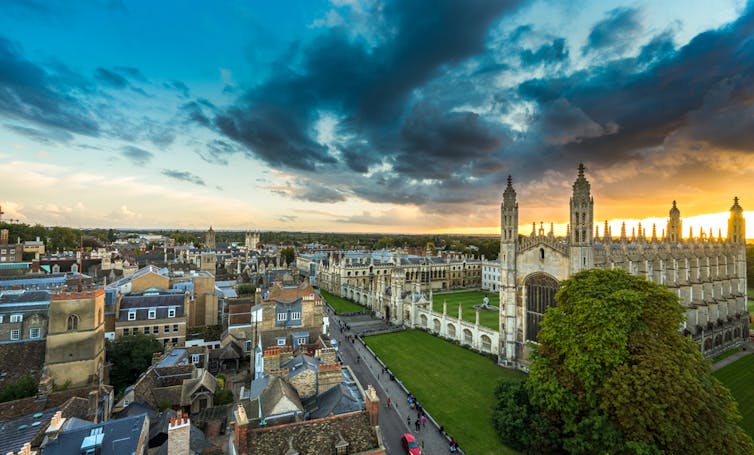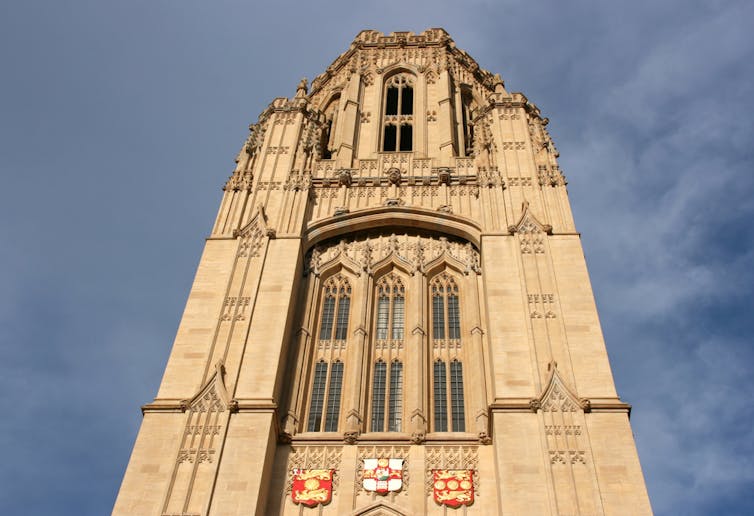
Steven Greer, University of Bristol
The University of Cambridge has embarked on a project to discover how it may have contributed to, and benefited financially from, slavery. This venture follows hot on the heels of a similar investigation at University College London, and a decision by the University of Glasgow to launch a “reparative justice programme” after having discovered it made the equivalent of £200m from the transatlantic slave trade.
Not everyone has welcomed these developments however. Trevor Phillips, former head of the Equality and Human Rights Commission, described the Cambridge inquiry as “virtue signalling on steroids”, unlikely to reveal anything we don’t already know. He argues that the money might be better spent attempting to find solutions to some of the current challenges facing non-white people in Britain.
These inquiries form part of the growing debate in British and other universities about how their connections with various historic wrongs, especially those connected with slavery and colonialism, should be addressed. And superficially, there are two possible responses: either they should do nothing at all, or they should recognise the tainted benefit, raise awareness about it, make a full public apology, and provide appropriate recompense to the descendants of direct victims.
But the histories of these institutions and the injustices themselves are extremely complex. So even if the first response is rejected, tricky issues arise with the alternative.
Let’s look first at the case for doing nothing. To begin with, distinctions need to be drawn between different kinds of historic wrongs, the benefits received, and degrees of culpability on the part of various institutions.
For example, by contrast with some of the cities in which they were established, British universities founded long after the formal abolition of slavery in most of the empire in 1833, are unlikely to have benefited directly from it. And any benefit derived from colonialism will probably have been shared by many other public and private institutions.
UK universities are, typically, also the beneficiaries of a range of other historic wrongs, with varying degrees of moral culpability. For example, construction of the University of Bristol’s iconic Wills Memorial Building was financed largely by the Wills tobacco fortune. Other historic sources of morally suspect income might include those derived from industries that were harmful to workers, the general public, and the environment.
All of this may suggest that singling out certain kinds of morally contaminated funds is less than honest about the full historical record. Yet to start apologising for the full range could be regarded as a vacuous exercise in tokenism, virtue signalling, gesture politics and moral grandstanding.
Healing wounds
But even if we reject the “do nothing” position, questions remain about how we should rise to the challenge of making suitable amends. Should we, for example, tear down statues of enthusiastic imperialists like Cecil Rhodes?
Or would it be better to keep them where they are, but add explanatory plaques exposing their hidden histories? Should we erect physical and virtual memorials to the victims, acknowledge the wrongs of the past, rename facilities which currently honour discredited historical figures, issue apologies, and find other ways of seeking to atone for the sins of our forebears?

Shutterstock/Tupungato
Several things need to be considered if we proceed down this path. First, while history matters, the wrongs of the present more urgently require attention than those of the past. And although there is almost universal consensus on what many of these are – human trafficking, child abuse, racism – there is much less agreement on how others, including excessive private wealth, chronic poverty, and limited access to higher education on the part of disadvantaged groups, should be tackled.
We should certainly seek to learn from the past. But the temptation to see it only as a series of heroic struggles between the good guys and the bad guys should be resisted.
The uncomfortable fact is that, in reality, history was typically much more complex and multidimensional. Two eminent late 18th-century Cambridge alumni, Thomas Clarkson and William Wilberforce, were for example, leading lights in the movement to abolish slavery. And the Wills family tobacco business pioneered canteens, free medical care, sports facilities and paid holidays for its workers.
The moral imperative to apologise for the behaviour of distant ancestors, far removed from responsibility or control, is difficult to determine. That said, in certain contexts, it may contribute to healing deep wounds.
Finally, where they can be identified, the descendants of the direct victims of past wrongs need to be consulted about what should be done now. The city of Bristol was, for example, not only directly involved in slavery and colonialism – it was also one of the first English cities where freed and escaped slaves established their own communities.
There are two main reasons why excluded voices, particularly those of their descendants, should be heard: first, they do not always chime with those which echo round the ivory towers; and second, unless inclusive consultations take place with such parties, subtle forms of elite domination are likely to remain.![]()
Steven Greer, Professor of Human Rights, University of Bristol
This article is republished from The Conversation under a Creative Commons license. Read the original article.
Disclaimer: The views expressed in the PolicyBristol Blog are solely those of the author and not representative of PolicyBristol or the University of Bristol.
